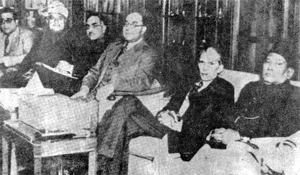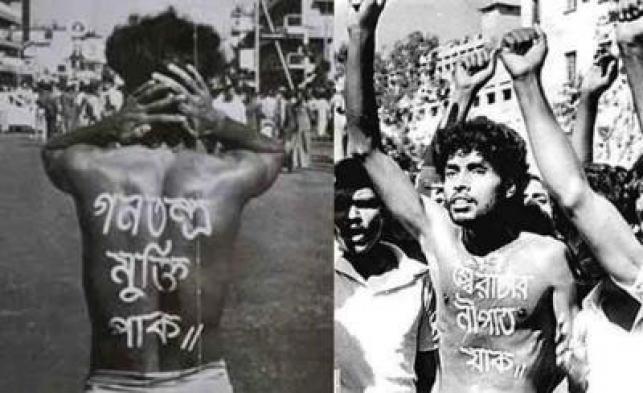A K Fazlul Huq was an eminent political elite of the whole Indian sub-continent. He held the Presidentship of All-India Muslim League and the Seretaryship of the Congress in 1918. Fazlul Huq became a central leader as a nominated member of the Legislative Council during the period between 1916 and 1920. Under Dyarchy, he was Education Minister of Bengal in 1924 for a period of six months. He was elected President of the ‘Krishak Praja Samiti’ in 1929. Then he became the first President of the ‘Krishak Praja Party’. He also attended two Round Table Conferences held in London to resolve the Constitutional problems of India. Fazlul Huq was elected the first Muslim Mayor of Calcutta Municipal Corporation in 1935.
‘Sher-e-Bangla’ (the Bengal Tiger) was how the people of Bengal greeted Fazlul Huq. He had dedicated his life to the welfare of the peasants. M.A. Jinnah was addressing the historic Muslim League session in Lahore in 1940 where the Pakistan Resolution was adopted. The audience erupted into spontaneous applause when Faziul Huq, at that time Chief Minister of united Bengal, entered the hall. Finding his voice drowned by the public outburst Jinnah resumed his seat saying, “Now that the tiger has arrived, the lamb must retire.”
After partition of India, Fazlul Huq led the United Front of opposition parties to victory in the 1954 election in East Pakistan and became the Chief Minister. Altaf Gauhar was appointed his Private Secretary in addition to his duties as Deputy Secretary in the Home department. A few weeks after taking over as Chief Minister Fazlul Huq went on a private visit to Calcutta where he declared, “I do not believe in the political division of the country. I am in fact not familiar with the new words Pakistan and Hindustan. When I speak of India I mean both the countries.”
Contradicting contradictions
On his return Altaf told him of the uproar that his statement had caused in the country. He looked at Altaf and asked, “Then why didn’t you contradict the statement?” Altaf was taken aback but soon realised that Fazlul Huq would say whatever he thought suited the occasion and then disown it. Most of the time Altaf was drafting clarification of the Chief Minister’s statements, now contradicting some denial only to deny the contradiction later.
The Bengalis knew their ‘tiger’ and loved him and he too had a genuine understanding of their problems and profound compassion for the poor. Altaf remembers a touching incident. He came, along with his wife, to see the house in which Altaf was living in Dacca -22 Hare Road.
It was a large mansion dominated by a magnificent banyan tree standing majestically on the front lawn. The proposal was to convert it into the Chief Minister’s residence. Fazlul Huq liked the house. As he was getting into the car he saw Altaf’s children playing under the tree. “Where will they play when you shift into an apartment?” he asked. Before Altaf could answer Fazlul Huq had made up his mind not to deprive the children of their tree. He continued to stay in his old house at 27 K.M. Das Lane in Hatkhola. The house at 22 Hare Road was later turned into the President’s House where Ayub Khan used to stay whenever he visited Dacca.
Source: Weekly Holiday










Politics of knowledge, wisdom, vision, erudition, patriotism and commitment to the common people has been replaced by thuggish and base politics. Hence personalities like Sher-e-Bangla is most likely to sink into oblivion in the very near future. Our new generation will only know ‘Mr. Jinnah said, ‘Urdu and Urdu alone will be the state language of Pakistan.’ And the audience cried, ‘No, No’. And a new history began. The whole episode of sacrifice by millions spanning a period of more than a century to free this subcontinent from the clutch of the colonial rulers has been squeezed almost into nothingness and one prodigal son, far, f-a-r older than the father became everything and anything the rulers wanted to make. This is us Bangalees, a rare species on earth who have proved ourselves a most unpredictable bunch of creatures that can run havoc if given freedom. We are Bangalees. (Read respected Syed Abul Maqsod’s ‘Bangalir paraswapharanspriha’ published in daily Prothom Alo several months ago).
I must speak once again about Sher-e-Bangla. He was the ‘Tiger of Bengal’, and the Royal Bengal Tiger so to say, in the true sense of the term. It’s quite obvious that lambs and goats must feel shy and scared to speak of him. That’s why the dates of his birth and death go almost unnoticed in this country for whose people he spent everything of his life. Actually, how could chicken hearted people evaluate such monumental personality as Sher-e-Bangla? But the sky, the air, the soil, the rivers and canals and the whole Nature of Bengal will remember Sher-e-Bangla forever, however ungrateful the people of this country might be.